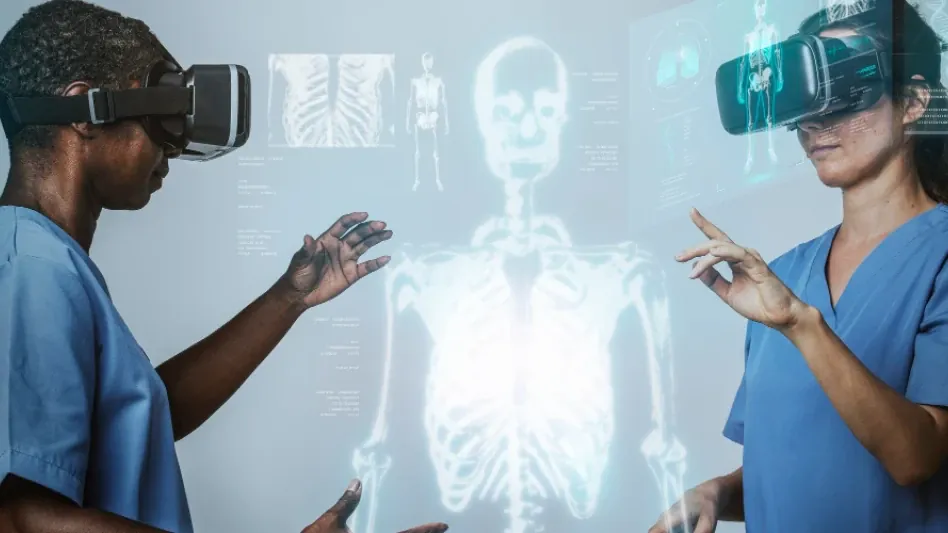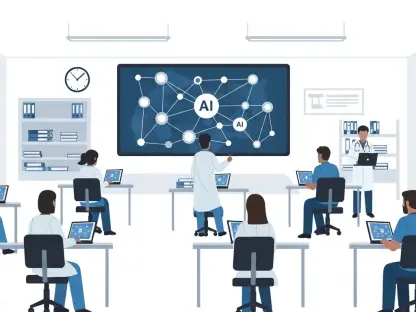The ViVE 2025 AI Power Rankings article offers a comprehensive analysis of the essential AI vendors poised to make significant impacts within the healthcare sector. This analysis is particularly timely and relevant as healthcare organizations are increasingly seeking to leverage artificial intelligence (AI) to improve efficiency, diagnostics, patient engagement, and overall outcomes. With the ViVE 2025 event serving as a critical platform, the article delineates how healthcare executives, IT leaders, and decision-makers can distinguish genuine innovation amid a market teeming with vendors promising AI capabilities.
AI’s Expanding Role in Healthcare
Enhancing Diagnostic Accuracy
AI is revolutionizing the way healthcare providers approach diagnostics. Vendors like Enlitic, Aidoc, and Infermedica are at the forefront, offering AI-driven solutions that enhance radiology optimization, imaging diagnostics, and overall clinical intelligence. These technologies are pivotal in reducing diagnostic errors and improving patient outcomes by providing more accurate and timely information to healthcare professionals. The benefits of enhanced diagnostic accuracy are manifold, including faster identification of conditions, more precise imaging analyses, and improved decision-making capabilities for doctors and clinicians.
Enlitic, for instance, leverages deep learning algorithms to improve radiology efficiency and accuracy, ensuring that radiologists can detect anomalies more effectively. Aidoc integrates seamlessly into existing workflows to provide real-time analysis, significantly reducing the time required for image interpretation. Infermedica offers sophisticated AI-driven platforms that assist in preliminary diagnostics, enabling healthcare practitioners to identify potential health issues early. These advancements not only improve patient care but also optimize the use of healthcare resources, exemplifying the transformative impact of AI in diagnostics.
Streamlining Clinical Workflows
Automation and workflow optimization are critical areas where AI is making substantial inroads. Vendors such as UiPath, Automation Anywhere, and GS Lab | GAVS Technologies are noted for their contributions to automating healthcare IT processes, clinical settings, and hospital operations management. By automating repetitive tasks, these solutions allow healthcare providers to focus more on patient care, leading to significant efficiency gains and reduced administrative burdens. Automation in healthcare settings encompasses a range of activities, from patient registration to resource allocation, all designed to streamline operations and improve service delivery.
UiPath utilizes robotic process automation (RPA) to automate routine tasks such as data entry, billing, and scheduling. This technology not only enhances operational efficiency but also reduces the likelihood of human error. Similarly, Automation Anywhere provides AI-driven tools that facilitate process automation in both clinical and non-clinical settings, supporting tasks like claims processing and patient monitoring. GS Lab | GAVS Technologies focuses on optimizing hospital operations with AI-powered solutions that automate supply chain management and patient flow. These initiatives collectively demonstrate the profound impact of AI-driven automation on enhancing healthcare workflows and improving patient care standards.
Priority on Real-World Applications
Tangible AI Solutions
The article stresses the need for healthcare leaders to prioritize vendors exhibiting real-world applications and live demonstrations over those relying on marketing hype. Vendors like Diligent Robotics and CalmWave are highlighted for their practical AI solutions that have been successfully implemented in clinical settings. The authenticity and applicable success of AI solutions in real-world scenarios are crucial for vendor evaluation. For example, Diligent Robotics’ Moxi robot is designed to assist healthcare workers by performing non-patient-facing tasks, such as fetching supplies and delivering specimens, thereby allowing nurses and doctors to spend more time with patients.
CalmWave offers an innovative approach to hospital operations management by utilizing AI to monitor and predict patient flow, optimizing staffing, and resource usage. The success of these implementations in actual healthcare environments underscores the importance of selecting vendors with proven track records of delivering tangible benefits. Furthermore, the ability of these solutions to scale and adapt to different clinical settings is a key consideration for healthcare leaders aiming to invest in reliable and effective AI technologies. This strategic focus on tangible, real-world applications helps ensure that AI investments translate into meaningful improvements in patient care and operational efficiency.
Customer Satisfaction and Benefits
Evaluating vendors based on customer satisfaction and the tangible benefits they offer to healthcare providers and payers is essential. Solutions that have been validated through real-world use and customer feedback are more likely to deliver on their promises. This approach helps healthcare organizations avoid investing in unproven technologies and ensures that they choose vendors with a track record of success. For instance, Diligent Robotics has received positive feedback from hospitals that report significant time savings and improved workflow efficiency due to reduced manual tasks.
Similarly, CalmWave’s solutions have been praised for their ability to enhance operational efficiency and reduce costs by providing actionable insights into hospital operations. These real-world endorsements provide valuable assurance to healthcare decision-makers that AI solutions will indeed deliver measurable improvements. Customer testimonials and case studies serve as important evaluative tools, highlighting the practical benefits and sustained performance of AI vendors’ offerings. By prioritizing vendors with high customer satisfaction rates and substantiated benefits, healthcare organizations can better navigate the crowded AI marketplace, confidently selecting technologies that integrate smoothly into existing systems and yield positive, quantifiable outcomes.
Enhancing Diagnostic and Clinical Decision Support
AI-Driven Diagnostic Assistance
Vendors such as Enlitic, Aidoc, and Infermedica are spotlighted for their advancements in AI-driven diagnostic assistance and clinical decision support. These technologies are pivotal in enhancing radiology optimization, imaging diagnostics, and overall clinical intelligence, ultimately leading to improved patient outcomes. By providing more accurate and timely information, these solutions help healthcare professionals make better-informed decisions. Enlitic’s deep learning algorithms can analyze complex medical images with high precision, aiding radiologists in detecting diseases at earlier stages.
Aidoc’s AI-powered imaging diagnostics tool integrates with existing hospital systems to provide real-time, triaged findings for acute pathologies, significantly speeding up the diagnostic process. Infermedica’s platform offers advanced diagnostic support by analyzing symptoms and medical history to generate accurate recommendations for further medical action. These cutting-edge solutions illustrate the transformative potential of AI in clinical settings, helping to minimize human error, expedite diagnoses, and enhance patient care.
Clinical Intelligence and Decision-Making
AI-powered clinical decision support systems are transforming the way healthcare providers approach patient care. These systems analyze vast amounts of data to provide insights that can improve diagnostic accuracy and treatment plans. Vendors like Aidoc and Infermedica are leading the way in this area, offering solutions that enhance clinical intelligence and support better decision-making processes. Aidoc’s AI algorithms are capable of sifting through extensive medical imaging data to highlight critical findings, assisting radiologists and other healthcare professionals in making prompt and precise decisions.
Infermedica employs sophisticated machine learning techniques to interpret patient data and suggest possible diagnoses, which can then be corroborated by healthcare providers. These systems not only aid in the initial diagnostic phase but also in devising effective treatment strategies, ensuring that patient care is data-driven and evidence-based. The ability of these AI solutions to integrate seamlessly with existing medical systems and provide real-time support is a key factor in their growing adoption. By enhancing the accuracy of clinical decisions, AI-driven systems contribute to better health outcomes and more efficient healthcare delivery.
Importance of Patient Engagement and Navigation
Personalized Patient Interactions
The article underscores the growing importance of AI in patient engagement and navigation. Solutions offered by vendors like Hyro.ai, Clearstep, and Abridge are highlighted for their capability to personalize patient interactions, automate medical conversation transcription, and improve telehealth services. Enhanced patient engagement is shown to lead to better patient satisfaction and adherence to treatment plans. Hyro.ai’s conversational AI platform facilitates intuitive, natural language interactions between patients and healthcare systems, providing personalized responses and support.
Clearstep uses AI-driven triage and navigation tools to guide patients through their healthcare journeys, from initial symptom assessment to finding appropriate care services. Abridge specializes in medical conversation transcription, utilizing AI to capture and summarize patient-provider interactions accurately. This technology not only enhances communication but also ensures that patients have a clear understanding of their medical consultations. By providing these advanced interactive capabilities, AI-driven solutions help build stronger patient relationships and encourage proactive health management.
Automating Medical Conversations
AI-driven solutions that automate medical conversation transcription and improve telehealth services are becoming increasingly important. Vendors like Abridge are at the forefront of this trend, offering technologies that streamline patient-provider communication and enhance the overall patient experience. These solutions help ensure that patients receive timely and accurate information, leading to better health outcomes. Abridge’s technology records and transcribes medical conversations, creating easily accessible summaries that patients can refer to after their visits.
This not only aids in comprehension and recall but also promotes transparency and trust in the patient-provider relationship. Additionally, AI-driven telehealth platforms improve accessibility to healthcare services, enabling remote consultations and continuous patient monitoring. These advancements are particularly beneficial in managing chronic conditions and ensuring timely interventions. By automating and enhancing medical communications, AI solutions contribute to a more efficient and patient-centric healthcare ecosystem, where information flow is seamless and patient satisfaction is prioritized.
Streamlining and Automating Processes
Healthcare IT Automation
Automation and workflow optimization emerge as critical areas where AI is making substantial inroads. Vendors like UiPath, Automation Anywhere, and GS Lab | GAVS Technologies are noted for their contributions to automating healthcare IT processes, clinical settings, and hospital operations management. The focus here is on how AI-driven automation can lead to significant efficiency gains and reduce the administrative burden on healthcare staff. UiPath, through its advanced RPA solutions, streamlines countless healthcare processes, from appointment scheduling to patient record updates, dramatically improving administrative productivity.
Automation Anywhere facilitates the automation of back-office functions, such as billing and claims processing, ensuring accuracy and efficiency in financial operations. GS Lab | GAVS Technologies employs AI to automate various aspects of hospital operations, including supply chain management and staff scheduling. These solutions not only optimize workflow efficiency but also allow healthcare professionals to redirect their efforts towards patient care, thereby improving overall service quality. By addressing the administrative challenges inherent in healthcare, AI-driven automation fosters a more effective and responsive healthcare system.
Clinical and Hospital Operations Management
AI-driven automation is also transforming clinical and hospital operations management. Vendors like Diligent Robotics and CalmWave are highlighted for their practical AI solutions that have been successfully implemented in clinical settings. These technologies help streamline operations, reduce costs, and improve overall efficiency, allowing healthcare providers to focus more on patient care. Diligent Robotics’ Moxi robot, which performs routine logistical tasks, is a prime example of how AI can alleviate the workload on nursing staff, enabling them to concentrate on direct patient interactions.
CalmWave employs AI to predict patient flow patterns, optimizing resource allocation and staffing levels, thus ensuring that hospitals can handle fluctuating patient volumes more effectively. These enhancements reduce operational bottlenecks and streamline healthcare delivery, ultimately leading to better patient outcomes. The integration of AI in hospital management systems exemplifies how technology can be leveraged to create more efficient, responsive, and patient-centered healthcare environments, where the focus remains firmly on delivering high-quality care.
Remote Monitoring and Digital Health
Wearable Health Monitoring
Remote monitoring and digital health are becoming increasingly important in healthcare. Vendors like BioIntelliSense and Faceheart Corp. are leading the way with wearable health monitoring solutions that provide continuous patient data. These technologies enable early intervention and management of chronic conditions, improving patient outcomes and reducing healthcare costs. BioIntelliSense’s BioButton and BioSticker devices capture and transmit vital signs and other health metrics, providing healthcare providers with real-time data for timely decision-making.
Faceheart Corp. specializes in remote monitoring technologies that can analyze facial expressions to detect stress and emotional states, offering a novel approach to patient care. These wearables not only facilitate constant health monitoring but also empower patients to take an active role in managing their health. The data collected through these devices can be integrated into patient health records, providing a comprehensive overview that enhances clinical assessments and interventions. The adoption of wearable health monitoring underscores the shift towards preventative care and patient empowerment in the healthcare landscape.
Mental Health Monitoring
AI-driven solutions for mental health monitoring are also gaining traction. Vendors like NeuroFlow are noted for their contributions to predictive mental health analytics and remote patient monitoring. These technologies help mental health professionals identify early signs of distress and intervene more proactively, mitigating potential crises and improving patient well-being. NeuroFlow’s platform employs machine learning algorithms to analyze patient-reported outcomes, biometric data, and other indicators to deliver actionable insights for mental health management.
By facilitating continuous monitoring and providing personalized care recommendations, these solutions support a more responsive and effective approach to mental health care. The ability to remotely track patient progress and adjust treatment plans in real-time is particularly beneficial in managing chronic mental health conditions. AI-driven mental health monitoring exemplifies the potential of technology to enhance patient care, reduce the burden on healthcare systems, and ultimately lead to better health outcomes.
Conclusion
The ViVE 2025 AI Power Rankings article presents an in-depth review of key AI vendors positioned to greatly impact the healthcare sector. This comprehensive analysis comes at a crucial time as healthcare organizations are increasingly adopting artificial intelligence to enhance efficiency, diagnostics, patient engagement, and overall patient outcomes. The article is particularly relevant with the ViVE 2025 event serving as an essential platform for showcasing innovations. It provides valuable insights for healthcare executives, IT leaders, and decision-makers seeking to identify authentic advancements in a crowded market filled with vendors touting AI capabilities.
By highlighting genuine innovation, the article assists stakeholders in navigating the complexities of AI integration within the healthcare industry. The rankings help differentiate between vendors who offer substantial, evidence-based solutions and those with mere promises. Thus, this analysis becomes an indispensable tool for anyone looking to make informed decisions about leveraging AI’s transformative potential in healthcare.









